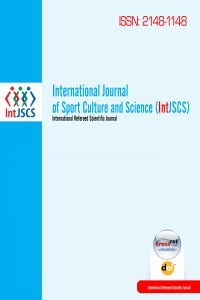Ethics in Sport: Socio-Political Point of View
___
- Ami, S.M. (2012). Dialogue among civilizations: Contexts and perspectives. UN Chronicle, 49(3), 11-14.
- Arkes, H.P. (2008, Winter). The role of government in shaping culture. Northwestern University Law Review, 102(1), 499-502.
- Beauchamp, T.L. (1982) Mill and utilitarian theories (pp. 71-106). In T.L. Beauchamp, Philosophical ethics: An introduction to moral philosophy. New York: McGraw-Hill.
- Bentham, J. (1789/1961). An introduction to the principles of morals and legislation. In Utilitarianism (pp. 7-398). Garden City, NY: Doubleday.
- Berigan, N., & Irwin, K. (2011). Culture, cooperation, and the general welfare. Social Psychology Quarterly, 74(4), 341-360. doi:10.1177/0190272511422451
- Brownell, S. (2014, July 10). Why we need social theory to understand sport mega events. Keynote presentation at the ISSA World Congress of Sociology of Sport 2014. Beijing, China.
- Dalai Lama says hope and secular ethics essential for world peace. (2015). Tibetan Review: The Monthy Magazine on all Aspects of Tibet, 50(1/2), 7.
- Foster, M. R. (2013). Global problems call for global solutions and solidarity. First step is get all progressives in a worldwide project. CCPA Monitor, 20(4), 28-29.
- Fredrick, D.M., Fredrick, E.A., Kaempfer, W.H., & Wobbekind, R.L. (2013). Panethnic Linsanity: Issues with research on discrimination in sports. Journal of Global Intelligence & Policy, 6(11), 1-22.
- Gordijn, E., Finchilescu, G., Brix, L., Wijnants, N., &Koomen, W. (2008). The influence of prejudice and stereotypes on anticipated affect: feelings about a potentially negative interaction with another ethnic group. South African Journal of Psychology, 38(4), 589-601.
- Hartman, C. (2011, June 23). NBA Draft 2011: Fulfilling the league’s global outreach with more international players. Christian Science Monitor. p. N.PAG.
- Hume, D. (1739/1964). A treatise of human nature. (L.A. Selby-Bigge, Ed.). Oxford: Clarendon Press. (Orginal work published in 1739)
- Johnson, M.B. Castillo, Y., Sacks, D.N., CavazoJr.,J., Edmonds, W.A., &Tenenbaum, G. (2008). Hard work beats talent until talent decides to work hard: Coaches perspective regarding differentiating elite and non-elite swimmers. International Journal of Sports Science and Coaching, 3(3), 417-430.
- Kezar, A. (2012). Bottom-up/top-down leadership: Contradiction or hidden phenomenon. Journal of Higher Education, 83(5), 725-760.
- Kortmann, K., Paveley, R., Levy, J., Aguilar, S.,Broggiato, A., Morgera, E., & …Tsioumani, E. (2009). United Nations activities. Environmental Policy & Law, 39(1), 2-35.
- Mill, J.S. (1863/1969). Utilitarianism. In J.M. Smith & E. Sosa (Eds.), Mill’s utilitarianism (pp. 31-88). Belmont, CA: Wadsworth.
- Murray, S. (2012). The two halves of sports-diplomacy. Diplomacy & Statecraft, 23(3), 576-592. doi:10.1080/09592296.2012.706544
- National Basketball Association. (2015). NBA Team rosters. Retrieved from: http://stats.nba.com/teams/
- Navasaitiene, S., &Perkumiene, D. (2009). Cooperation of cultural centres and community organizations in the nuturance of the ethnic culture in rural areas. Proceedings of the International Scientific Conference: Rural Development, 4(1), 321-326.
- Parry, J. (2006). Sport and Olympism: Universals and multiculturalism. Journal of the Philosophy of Sport, 33(2), 188-204.
- Pigman, G.A. (2014). International sport and diplomacy’s public dimension: Governments, sporting federations and the global audience. Diplomacy & Statecraft, 25(1), 94-114. doi:10.1080/09592296.2014.873613
- Playing the game (2006). Focus, 21(1), 1-36. Retrieved from http://aid.dfat.gov.au/publications/focus/jan06/focus_jan06.pdf
- Politzer, G., &Carles, L. (2001). Belief revision and uncertain reasoning. Thinking & Reasoning, 7(3), 217-234. doi:10.1080/13546780143000017
- Ramadas, S., Serpa, S., Rosado, A., Gouveia, E. &Maroco, J. (2013). Development and validation of the elite athlete commitment scale. Revista De Psicologia Del Deporte, 22(2), 415-425.
- Richman, L.S. & Leary, M.R. (2009). Reactions to discrimination, stigmatization, ostracism, and other forms of interpersonal rejection. Psychological Review, 116(2), 365-383. doi:10.1037/a0015250.
- Schneider, R.C. (2010). Developing moral sport policies through act-utilitarianism based on Bentham’s hedonic calculus. Sport Management International Journal, 6(2), 95-106. Retrieved from http://www.choregia.org.
- Seymour, R. (2006, May 1). A question of sport?.Middle East, (367), 62-63.
- Shady, S.H., & Larson, M. (2010). Tolerance, empathy, or inclusion? Insights from Martin Buber. Educational Theory, 60(1), 81-96. doi:1111/j.1741-5446.2010.00347.x
- Sport great for human bonding: Queen. (2010). Weekend Post, The (Cairns)
- United Nations Office on Sport for Development and Peace (UNOSDP) (2014). Sport for development and peace: The UN system in action. Retrieved June 9, 2014 from http://www.un.org/wcm/content/site/sport/home
- Vermeulen, J., &Verweel, P. (2009). Participation in sport: Bonding and bridging as identity work. Sport in Society, 12(9), 1206-1219. doi:10.1080/17430430903137866
- World leaders attend first ever IOC president’s dinner. (2014, June 6). Retrieved from: http://www.olympic.org/news/world-leaders-attend-first-ever-ioc-president-s-dinner/223306
- ISSN: 2148-1148
- Başlangıç: 2013
- Yayıncı: Uluslararası Bilim Kültür ve Spor Derneği (UBİKS)
Does Exercising for a While Changes the Motivation of Exercise Participation?
Özgür ERİKOĞLU, Nevin GÜZEL, Mehmet PENSE, Gamze ERİKOĞLU ÖRER
Özgür ERİKOĞLU, Nevin GÜZEL, Mehmet PENSE, Gamze ERİKOĞLU ÖRER
Burcin OLCUCU, Serife VATANSEVER, Gul TIRYAKI-SONMEZ, Seda BURKAN ONER
Carving Technique – Methodical Perspectives
Türkiye'deki Gençlerin Sosyal Medya Bağımlılık Düzeylerine Yönelik Nicel Bir Araştırma
